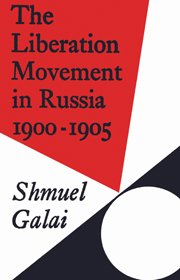Book contents
- Frontmatter
- Contents
- Dedication
- Acknowledgments
- Note on dates, etc.
- List of abbreviations
- Introduction
- Part One ORIGINS
- Part Two THE FORMATION OF THE LIBERATION MOVEMENT
- Part Three WAR AND REVOLUTION
- Appendix A The origins of Beseda
- Appendix B A bibliographical note on the writings of Kuskova and Prokopovich in the years 1898–9
- Appendix C Note on sources on the formation of the Liberation Movement
- Bibliography
- Index
Introduction
Published online by Cambridge University Press: 22 September 2009
- Frontmatter
- Contents
- Dedication
- Acknowledgments
- Note on dates, etc.
- List of abbreviations
- Introduction
- Part One ORIGINS
- Part Two THE FORMATION OF THE LIBERATION MOVEMENT
- Part Three WAR AND REVOLUTION
- Appendix A The origins of Beseda
- Appendix B A bibliographical note on the writings of Kuskova and Prokopovich in the years 1898–9
- Appendix C Note on sources on the formation of the Liberation Movement
- Bibliography
- Index
Summary
It is now generally accepted that the Liberation Movement (referred to from the beginning as the ‘Liberal Movement’), which emerged in Russia at the turn of the twentieth century, played a very important role in the political events which culminated in the First Russian Revolution (of 1905). But little has been known until now about the origins, composition, organizational framework and significance of the ‘liberalism’ of this movement.
The emergence of the Liberation Movement coincided with the establishment of the other two main oppositional forces in tsarist Russia – the Russian Social-Democratic Workers Party, or RSDRP (Rossiyskaya Sotsial-Demokraticheskaya Rabochaya Partiya), and the party of Socialist Revolutionaries, or SR. All three were, to a large extent, a by-product of the dichotomy which characterized the policies of the autocratic regime during the last two decades of the nineteenth century and the first few years of the twentieth century. On the one hand it conducted a dynamic economic policy, the aim of which was the rapid industrialization of Russia, and, on the other, it displayed an ultra-conservative attitude towards social and political questions.
Russian autocracy was a more arbitrary and oppressive regime than any of the absolutist states of the West had ever been. It became even more despotic in the period 1881–1904. All sections of the population, except to some extent the nobility, were denied personal freedom and political rights. Freedom of speech, of the press and of conscience were non-existent.
- Type
- Chapter
- Information
- The Liberation Movement in Russia 1900–1905 , pp. 1 - 4Publisher: Cambridge University PressPrint publication year: 1973

